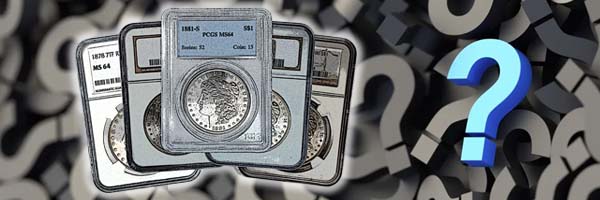The Pros and Cons of Getting Your Coins Certified
Nov 8th 2023
Although collectors love the beauty and history of the coins in their collection, value is also a very important factor. Determining a coin’s worth largely depends on the condition or “grade” of the piece in question. Grading is a subjective art and crucially important in terms of the value of a coin.
You may have seen a collectible coin encased in a hard plastic case with an official looking label. These coins have generally been certified by an outside company using official grade descriptions. You may ask yourself if you should be getting pieces in your collection certified.
Certification of Coins:
Due to the subjective nature of grading coins certification can be a real advantage to a collector. When a coin is considered for certification, it is looked at by three separate experts reviewing authenticity, strike, preservation, luster, color and attractiveness. A consensus grade is then assigned and the coin is encapsulated in the hard plastic “slab” and labeled.
Once the coin is encapsulated and labeled it is not only well protected but allows anyone looking at the piece a reliable judgement of condition and thus value. (Keep in mind that not all certification businesses are equally respected, PCGS and NGC are the most trusted in the business.)
Deciding whether to submit your own pieces for certification takes some thought. Here are a few things to consider.
Three Pros for Grading Your Coins:
- Guarantee of Authenticity and Grade: Every coin is examined for authenticity and condition. The coin is given a consensus grade and labeled as such taking personal judgment out of the equation.
- Exceptional Protection: The plastic holder used for certified coins is called a slab and is designed to view and protect the coin during transportation, shipping and for long term storage.
- Enhance Assurance: Collectors trust most certified grades on slabbed coins and you can more easily buy and sell these pieces with the piece of mind that the coin is exactly what’s expected.
Three Cons for Grading Your Coins:
- Cost: Getting a coin certified can be expensive as you pay a fee as well as insurance and shipping costs. You’ll want to carefully consider the expected value of the piece before choosing certification.
- Risk Assessment: Passing on a precious treasure to hands other than your own is always difficult. Getting your coin certified also brings in the added risk of shipping damage or loss.
- Grading Updates: Grading standards continue to evolve and having your coin certified will, at least temporarily, lock in that assessment. You may find that in the future your piece has been over or under graded based on updated conventions.
Making the Final Decision:
The question becomes, will the expense and risk of certifying your coin enhance your collection and help with resale value? You’ll need to assess that for each individual piece and may find it is worthwhile when you want to confirm authenticity, or the added value of certification will make your coin easier to sell.

